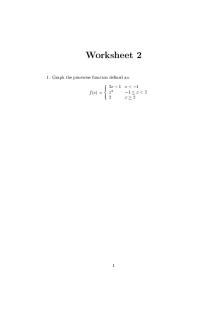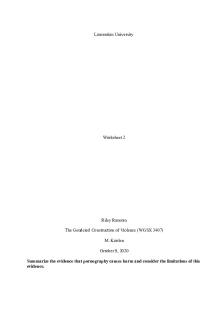Worksheet #2 PDF

| Title | Worksheet #2 |
|---|---|
| Author | Howard Guyton |
| Course | The Qu'Ran And The Bible |
| Institution | Lewis University |
| Pages | 4 |
| File Size | 109 KB |
| File Type | |
| Total Downloads | 46 |
| Total Views | 170 |
Summary
This worksheet 2 of week 2 for Rothchild's class....
Description
al-An‘ām, “The Cattle” (Q 6:74-83) Abraham according to the Quran Worksheet
Rothschild — Quran and the Bible
1. What is the date and provenance of this sūrah? ● Makkan period. 2. Who is the intended (historical) audience of this sūrah? ● It describes the lineage of Abraham differently, which is a large part of their identities. 3. What is the primary intention of the sūrah? ● The primary concern of the sūrah is to refute idols, jinn, and celestial bodies. 4. What do various hadīth say about the transmission and rewards for reading this sūrah? ● The Bible is partly historically accurate and partly metaphor or hyperbole. 5. How does the sūrah begin? Why? ● With a powerful statement with God as the universal and omniscient creator. 6. Who is Abraham’s father in the Quran? In the Bible? Is Azar literally Abraham’s father? Compare Q 2:133. Is it odd that Abraham addresses his father by his name? Why might he do so? ● Azar. In the Qu’ran, Azar is Abraham’s father. In the Bible, Terah is his father. Azar is not literally his father. Azar may have been a second name for his father in order to disparage his idol. As well, Azar could have been his uncle who was seen as an older paternal figure. 7. According to the Quran, does Abraham worship the star, moon, and sun? Is this a form of shirk? What are some of the theories explaining his behavior in this story? ● It begins “Kaf, ha, ya, ayn, sad” five arabic separated letters which while unclear, some suggest reference to different names and attributes of God in the Quran or to constitute a name of God or a name of the Quran. 8. Who does the first person plural (i.e., “we”) refer to in this passage? ● Torah. 9. Is the passage a revelation from God? How do you know? ● Yes. 10. What does God show Abraham? Why? ● Refereed as a prophet. 11. What are the observations of the world and natural phenomena said to disclose to human beings of sound mind? ● The observations are the fact that great celestial bodies such as the sun and the moon eventually set, which shows the limitations of one’s current spiritual station. 12. How does this passage support the Islamic notion of tawhid? ● It supports the passage because it shows that even the sun and the moon eventually set. This means that God is greater than all, because he could never possibly set. 13. Explain in detail the legend of Nimrod and how it relates to this story about Abraham?
● Nimrod had a dream that one day, a boy would be born and usurp his power, so he had all young boys in the kingdom killed. Abraham was born in a cave and hidden for his safety. 14. How do Sufi commentators interpret this passage? What is yaqin? ● They interpret the passage by having no doubt about the truth of a matter and arriving at accurate, doubt-free knowledge through exact verification 15. Can a true prophet’s parents be unbelievers? ● A true prophet’s parents can be unbelievers. 16. What is jahiliyyah? How does this principle figure in the life of Muhammad? ● It refers to ignorance. 17. Does Abraham violate the Quranic injunction to maintain good relations with his parents in this passage? ● Abraham does not violate the Quranic injunction. 18. What is the meaning of “certainty” in v. 75? ● As a result of contemplation or as a result from a vision the knowledge that comes from it. 19. What is the meaning of “turn” in v. 79? ● It means complete obedience to God. To put all focus on God and do not commit idolatry. 20. What is the meaning of hanif in the Quran? ● Associated with Abraham and Prophet Muhammed, aviodance of all types of idolatry. 21. What is the meaning of the phrase “save as my Lord wills” in v. 80? ● Abraham only fears what come from God and God only, and if he were to be scared from anything else it would have come from God’s will. 22. What is the meaning of the phrase God “encompasses all things in Knowledge? ● Everything occurs according to God’s wisdome and knowledge. 23. Are the idols in this passage real? How do you know? ● They are real, if they are not real they can’t do anything wrong unless they are real. 24. What does it mean to have “greater right to security? ● It mean s to have patience and to wait on God. 25. What is the meaning of the sentence: “We raise in degrees whomsoever We will?” ● It means God gives some more degrees of power or position than others. 26. How would you characterize Abraham in this passage? Why is this characterization effective as a form of persuasion with the audience? ● He is right-doing because he was doing his best according to God. This is important because if he wasn’t pious people would not want to follow him towards monothesim.
Maryam, “Mary” (Q 19:41-50) Abraham according to the Quran Worksheet II Rothschild — Quran and the Bible 1. What is the date and provenance of this sūrah? ● Early Mecca. 2. What literary characteristics are unique to this sūrah? ● The longest Sura to have a defined rhyming pattern. 3. What is the primary intention of the sūrah? ● Previous Prophets teaching, v.41-50 refer to the teaching of Abraham in regard to idolatry and false Gods. 4. By what name is God repeatedly referred to in this sūrah? ● “Al-Rahman” the compassionate one. 5. What do various hadīth say about the transmission and rewards for reading this sūrah? ● With a powerful statement with God as the universal and omniscient creator. 6. How does the sūrah begin? Why? ● It begins “Kaf, ha, ya, ayn, sad” five arabic separated letters which while unclear, some suggest reference to different names and attributes of God in the Qu’ran or to constitute a name of God or a name of the Qu’ran. 7. To what book does the sūrah refer in v. 41? ● The Torah. 8. What does the word “truthful” mean in v. 41? Who else is described in this way in the Quran? ● The word truthful means sincere or loyal. It describes Mary, Joseph, and Idris. When used in the plural form, refers to those who believe earnestly in God, the Prophets. 9. Islamic tradition makes a distinction between the title prophet (nabī) and messenger (rasūl). Explain. ● Nabī is those given a message from God about change, either good or bad. Rasūl means bringing revelations of new religious law. 10. According to the Quran, is Abraham a prophet, a messenger or both? ● Abraham is both but he’s only referred to as a Prophet in the Qu’ran itself. 11. In this passage, what topic does Abraham dispute with his father? ● Abraham disputes with his father that he is committing shirk by worshiping false Gods. 12. What is Abraham’s argument? ● Abraham’s argument is that to worship those Gods is illogical because they are blind and deaf, metaphorically speaking, and less capable than their devotees. 13. Is human age relevant to the manifestation of God’s will? ● No because he knows more about Gods will than his father. 14. What is the meaning of the phrase “worship not Satan?” ● It means to not obey Satan’s promptings towards evil. 15. What is the meaning of the expression, “friend” in v. 45? How does the Sufi tradition use this expression?
● The meaning of the expression is Wali, ‘protector’ term to signify friend of God and adversary to Satan. 16. What is the vocative phrase, “O my father” meant to convey? ● It is meant to convey his love and concern for his father’s well-being. 17. Explain the meaning of “I shall surely stone you” in verse 46. ● The meaning is to curse him or stone him with words. 18. What is the significance of Abraham’s response “Peace be upon you” (v. 47) in the practice of Islam today? Please provide an English transliteration of this phrase. ● As salaam ulaykum, This is showing the greeting of peace towards those who have contempt towards you. 19. In v. 48, why does Abraham say that he will not be “wretch?” What proof do we have that Abraham is correct? ● Abraham says that because it means that God will answer his prayers and supplications. Called upon the Lord to give him family/children and was given Isaac and Jacob. 20. What does Abraham do as a result of the dispute with his father? What is the significance of this action? ● Abraham leaves home to migrate to the holy land. He was willingly blindly follow his faith in the Lord. 21. How does this Abrahamic vignette fit this surah’s theme of God’s compassion? ● Bestowing blessed children upon Prophets and other holy people. 22. How does this surah complement the Quranic portrait of Abraham in Q 6:74-83? ● Q 6:74-83 shows Abraham’s blind faith and belief in the Lord and later in Q 19:41-50 was rewarded for his faith with children....
Similar Free PDFs

Worksheet 2
- 8 Pages

Worksheet 2
- 7 Pages

Worksheet #2
- 4 Pages

Worksheet 2
- 6 Pages

Worksheet 2
- 3 Pages

Worksheet #2
- 4 Pages

Ch. 2 worksheet - chapter 2
- 3 Pages

Atg worksheet adjpeople 2
- 3 Pages

HUBS191 Tutorial 2 Worksheet
- 6 Pages

WGSX Worksheet 2
- 4 Pages

Momentum-worksheet-2
- 18 Pages

Worksheet 2 - Assignment
- 3 Pages

Similar Triangles Worksheet-2
- 2 Pages

Discrete mathematics worksheet 2
- 1 Pages

Oxford Comma Worksheet 2
- 2 Pages

Alkanes Worksheet 2
- 4 Pages
Popular Institutions
- Tinajero National High School - Annex
- Politeknik Caltex Riau
- Yokohama City University
- SGT University
- University of Al-Qadisiyah
- Divine Word College of Vigan
- Techniek College Rotterdam
- Universidade de Santiago
- Universiti Teknologi MARA Cawangan Johor Kampus Pasir Gudang
- Poltekkes Kemenkes Yogyakarta
- Baguio City National High School
- Colegio san marcos
- preparatoria uno
- Centro de Bachillerato Tecnológico Industrial y de Servicios No. 107
- Dalian Maritime University
- Quang Trung Secondary School
- Colegio Tecnológico en Informática
- Corporación Regional de Educación Superior
- Grupo CEDVA
- Dar Al Uloom University
- Centro de Estudios Preuniversitarios de la Universidad Nacional de Ingeniería
- 上智大学
- Aakash International School, Nuna Majara
- San Felipe Neri Catholic School
- Kang Chiao International School - New Taipei City
- Misamis Occidental National High School
- Institución Educativa Escuela Normal Juan Ladrilleros
- Kolehiyo ng Pantukan
- Batanes State College
- Instituto Continental
- Sekolah Menengah Kejuruan Kesehatan Kaltara (Tarakan)
- Colegio de La Inmaculada Concepcion - Cebu